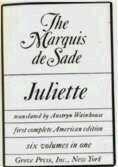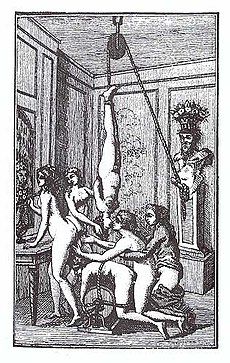Juliette (novel): Difference between revisions
m Reverted edits by 71.40.85.2 (HG) |
|||
| Line 17: | Line 17: | ||
Soon after this, the male character Brisatesta narrates two scandalous encounters. The first is with "Princess Sophia, niece of the King of Prussia", who has just married "the Stadtholder" at the Hague. This is presumably intended for [[Wilhelmina of Prussia, Princess of Orange]], who married [[William V of Orange]], the last Dutch Stadtholder, in 1767, and was still alive when ''Juliette'' was published. The second encounter is with [[Catherine the Great]], notorious [[Emperor of Russia|Empress of Russia]]. |
Soon after this, the male character Brisatesta narrates two scandalous encounters. The first is with "Princess Sophia, niece of the King of Prussia", who has just married "the Stadtholder" at the Hague. This is presumably intended for [[Wilhelmina of Prussia, Princess of Orange]], who married [[William V of Orange]], the last Dutch Stadtholder, in 1767, and was still alive when ''Juliette'' was published. The second encounter is with [[Catherine the Great]], notorious [[Emperor of Russia|Empress of Russia]]. |
||
Though the villians in the story energetically deny the existence of God you get to see them using expresions like "Bless my Soul" and "Holy Providence", between action the Characters spent long times discussing their Atheist beliefs and the "Right" of the stronger to enslave and hurt the weaker, so many pages of Philosophy make the book practically unreadable, in Juliette Sade indirectly invites people to commit all sort of sin and crime, this book is full of perversions like Pedophilia and Scatophilia, it really causes more disgust and Nausea than sexual arouse. |
|||
== Analysis and influence == |
== Analysis and influence == |
||
Revision as of 22:06, 12 February 2009

Juliette is a novel written by the Marquis de Sade and published 1797–1801, accompanying Sade's Nouvelle Justine. Whilst Justine, Juliette's sister, was a virtuous woman who consequently encountered nothing but despair and abuse, Juliette is an amoral nymphomaniac who ends up successful and happy.
The full title of the novel in the original French is Histoire de Juliette ou les Prospérités du vice, and the English title is "Juliette, or Vice Amply Rewarded" (Versus "Justine; or Good Conduct Well-Chastised", considered to be the prequel of Juliette).
Both Justine and Juliette were published anonymously. Napoleon ordered the arrest of the author, and as a result Sade was incarcerated without trial for the last 13 years of his life.
Plot summary

Juliette is raised in a convent, but at the age of 13 she is seduced by a woman who immediately explains that morality, religion and other such concepts are meaningless. There are plenty of similar philosophical musings during the book, all attacking the ideas of God, morals, remorse, love, etc, the overall conclusion being that the only aim in life is "to enjoy oneself at no matter whose expense." Juliette takes this to the extreme and manages to murder her way through numerous people, including various family members and friends.
During the novel, which follows Juliette through the ages of 13 to about 30, the wanton anti-heroine engages in virtually every form of depravity and encounters a series of like-minded libertines, such as the ferocious Clairwil, whose main passion is in murdering young men, and Saint Fond, a 50-year-old multi-millionaire who commits incest with his daughter, murders his father, tortures young girls to death on a daily basis and even plots an ambitious scheme to provoke a famine that will wipe out half the population of France.
Real people in Juliette
A long audience with Pope Pius VI is one of the most extensive scenes in Juliette. The heroine shows off her learning to the Pope (whom she most often addresses by his secular name "Braschi") with a verbal catalogue of alleged immoralities committed by his predecessors. The audience ends, like almost every other scene in the narrative, with an orgy.
Soon after this, the male character Brisatesta narrates two scandalous encounters. The first is with "Princess Sophia, niece of the King of Prussia", who has just married "the Stadtholder" at the Hague. This is presumably intended for Wilhelmina of Prussia, Princess of Orange, who married William V of Orange, the last Dutch Stadtholder, in 1767, and was still alive when Juliette was published. The second encounter is with Catherine the Great, notorious Empress of Russia.
Analysis and influence
One of the essays in Max Horkheimer and Theodor Adorno's Dialectic of Enlightenment (1947) is titled "Juliette or Enlightenment and Morality" and analyzes Juliette as the embodiment of the philosophy of enlightenment. They write: "she demonizes Catholicism as the most-up-to-date mythology, and with it civilization as a whole […] her procedures are enlightened and efficient as she goes about her work of sacrilege […] She favours system and consequence."
Andrea Dworkin, who vilified Sade as the archetypal woman-hating pornographer, is said to have modeled her first novel Ice and Fire (1986) on Juliette.[citation needed]
External links
- Online exhibition on illustrations of Juliette, by the World Museum on Erotic Art
- Full text of Juliette, in French

